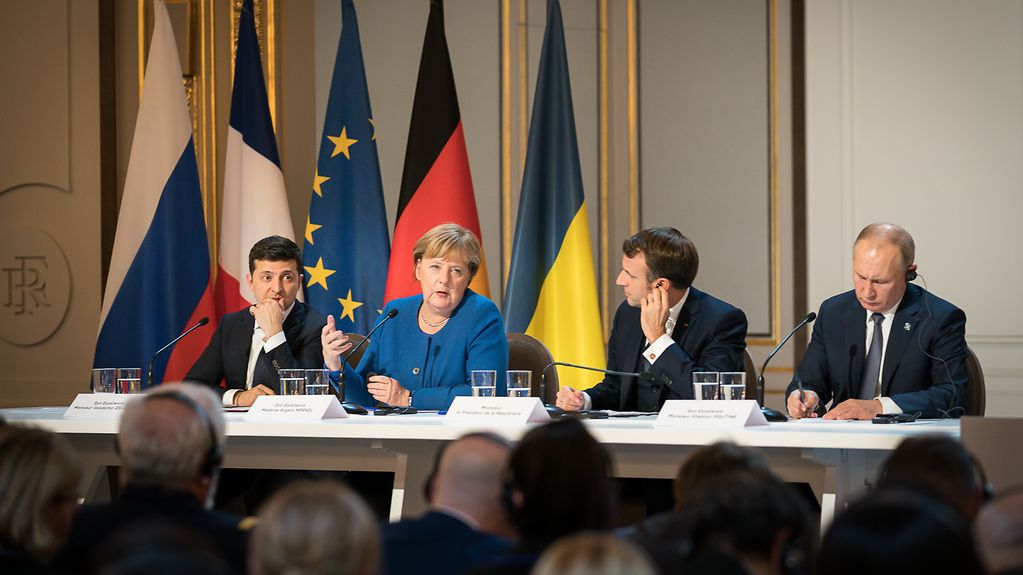Normandy summit on conflict in eastern Ukraine
At a four-way meeting in Paris, Chancellor Angela Merkel and the Presidents of France, Russia and Ukraine have agreed on a ceasefire in eastern Ukraine by the end of 2019. Further steps were also agreed to de-escalate the situation in the region.

At the press conference President Zelensky, Chancellor Merkel, President Macron and President Putin stressed that their primary objective is to achieve a ceasefire by the end of this year
Photo: Bundesregierung/Kugler
At a Normandy group (or N4) meeting on Monday in Paris, Chancellor Angela Merkel and Presidents Emmanuel Macron from France, Vladimir Putin from Russia and Volodymyr Zelensky from Ukraine agreed that a complete ceasefire should be in place in eastern Ukraine by the end of 2019.
Heavy weaponry is to be withdrawn from the area and troops and equipment disengaged by 3 March 2020. These are some of the points laid out in joint conclusions.
Chancellor Angela Merkel declared herself "extremely satisfied" with the outcomes of the meeting. "Realistic things have been agreed," she reported. "Today we have overcome the period of standstill," she said, and stressed, "We will naturally continue along this road." It was the first N4 meeting for three years.
Making use of the new dynamics
In 2019 the dynamics changed. Concrete progress was achieved on the ground in eastern Ukraine. In early September, for instance, Ukraine and Russia exchanged prisoners at bilateral level. 35 prisoners on each side were released, including the 24 sailors Russia arrested in November 2018 in the Kerch Strait.
The last Normandy format summit, named after the first meeting of this sort held in 2014 in Normandy, took place in Berlin in October 2016. Since this meeting there have been intensive consultations at various levels, but it has not proved possible to significantly advance the peace process in Ukraine over the last three years, and finally implement the Minsk Package of Measures agreed in February 2015. These measure focus primarily on a stable ceasefire, the withdrawal of heavy weaponry behind the contact line and preparations for local elections in line with Ukrainian law and overseen by the OSCE (Organization for Security and Co-operation in Europe).
The disengagement of troops agreed in 2016 has now been finalised in all three pilot areas (Stanytsia-Luhanska, Zolote and Petrivske). And at humanitarian level, progress has been made with the reopening of the bridge across the contact line at Stanytsia-Luhanska, which had been destroyed by fighting. This makes it easier for the local civilian population to cross the contact line, especially with winter approaching.
"We have managed something that we discussed many years ago here in Paris – the implementation of what is known as the Steinmeier formula," stressed the Chancellor, who also spoke of a “major breakthrough”. The Steinmeier formula deals with one aspect of the Minsk agreements: the provisional entry into force of the special status law on the day of local elections in the non-government-controlled areas and its permanent application once the ODIHR has confirmed that the elections in general complied with Ukrainian legislation and OSCE standards.
Germany remains actively engaged
This was another important step in confidence building for the implementation of the Minsk Agreements. It will also help enhance the security situation at local level.
The German government welcomes all these steps, which were preceded by intensive negotiations at the level of foreign-policy advisors of the heads of state and government of the N4 states.
One-on-one talks with Presidents Putin and Zelensky
Early on Monday afternoon, bilateral meetings were first on the agenda in Paris. The Chancellor met briefly with Russian President Vladimir Putin, before a short bilateral meeting with Ukrainian President Volodymyr Zelensky. The focus of both meetings was on bilateral issues and international topics.